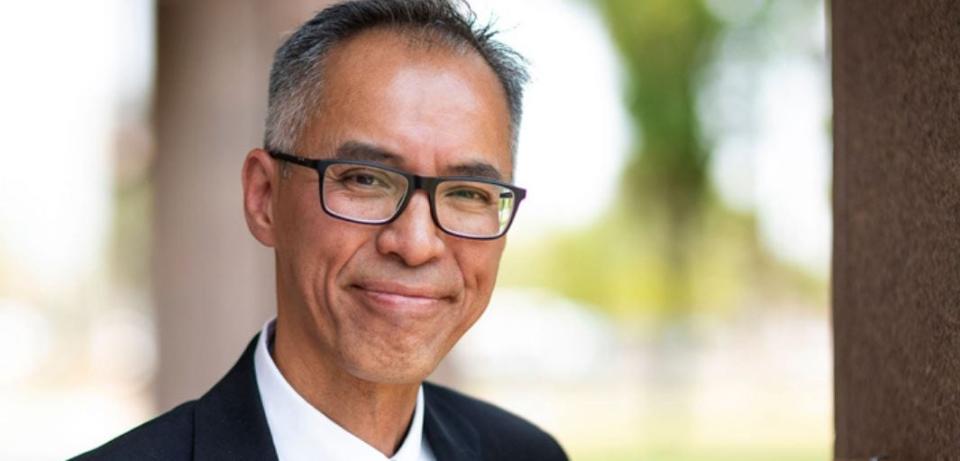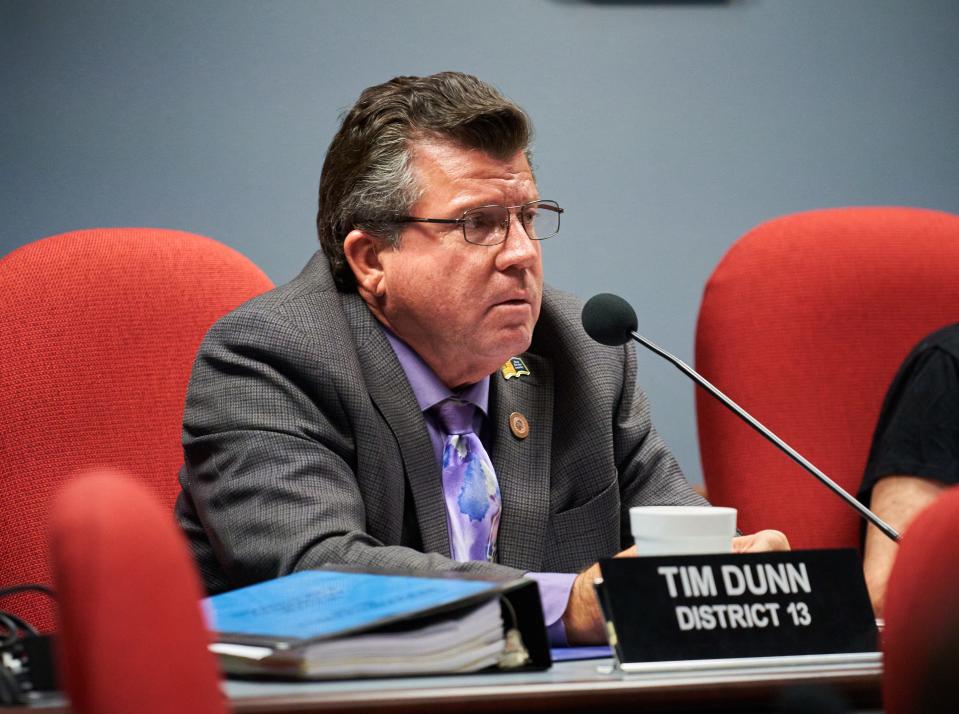Arizona senior care facilities closer to major reforms under bills passed at state Capitol
Arizona seniors are one step closer to better protections in assisted living facilities.
The Arizona House of Representatives has overwhelmingly passed two bills that would put tighter controls on an industry that has long operated with little oversight and meager penalties for endangering residents.
The first measure, sponsored by Rep. Quang Nguyen, R-Prescott Valley, would require assisted living facilities to allow residents to post cameras in their rooms, require facilities to report physical altercations between residents to the state health department and adhere to stricter hiring practices.
Nguyen's bill passed 48 to 8, with all present Democrats and most Republicans voting for it.

The second bill passed the House 49 to 10 on Feb. 29. Sponsored by Rep. Tim Dunn, R-Yuma, the measure would make assisted living facilities pay stiffer fines for endangering residents and get special licenses if they offer "memory care." The facilities currently can offer such care, and charge residents more for it, without any additional requirements.
Under the proposals, employees working at facilities licensed for memory care would have to take at least eight hours of initial dementia care training and four hours of additional training every year.
The bill likely will see amendments as it moves through the state Senate, but changes so far only have added tougher requirements on the industry.
"This is just amazing to me," said Kanji Matsunaga, whose mother Carol suffered a series of injuries at Heritage Village in Mesa. "This would change everything."
Matsunaga recently got involved with reform efforts, after learning from a reporter the full story about what happened to her mom when she was attacked by a fellow resident in 2022.
Carol Caruss was beat up by a fellow Heritage Village resident during a chaotic night that state regulators never heard about. Carol later suffered falls + other injuries on top of that. Her daughter, 2nd to left, shared her mom's story at the Capitol today w/ @alzassociation. https://t.co/zTZH5vzoXz
— Caitlin McGlade (@CaitMcGlade) February 1, 2024
Arizona has some of the weakest protections for assisted living residents in the country, but if the proposals are enacted the state could emerge as a leader in stringent oversight.
At least 20 states indicated they did not have any additional licensing requirements for "memory care," according to an Arizona Republic survey of state health departments in 2022.
A representative from the Alzheimer's Association Desert Southwest Chapter called Dunn's bill a "beacon of hope" during a Feb. 15 committee hearing.

"In the past year alone, I've been inundated with harrowing tales of individuals suffering within assisted living facilities," said Tory Roberg, the association's director of government affairs. "Stories of abuse, neglect and even tragic death. This is simply unacceptable."
The bills now move to the Arizona Senate for consideration. They offer solutions to senior living problems exposed by the Arizona Republic's investigative series "The Bitter End."
"The Bitter End" chronicled widespread injuries, violence and death within the state's assisted living facilities. State regulators have done little to hold facilities accountable.
"There are new senior living companies popping up all over, acquisition after acquisition. Even though they have poorly performing facilities already, they just keep adding to their portfolios because it's big money," said Jennifer Awinda, a former facility manager, during the Feb. 15 committee hearing. "There is no regard to care with a lot of these companies."
More: Lawmakers, governor seek major changes for assisted living in Ariz. following Republic investigation
One woman told lawmakers that she was surprised how little training caregivers receive to care for people with dementia when she had to move her mother into a facility after a stroke.
"How could I possibly place my mother or my trust in these strangers who called themselves dementia care professionals because they watched a video?" she said. "Sometimes life doesn't give you choices."
The Professional Firefighters of Arizona's lobbyist urged lawmakers to approve Dunn's bill, saying better training and steeper fines would help stem some of the increasing problems firefighters are responding to around the state.
The Arizona Department of Health Services also backs the bill, though the assistant licensing director stopped short of saying whether the proposed cap on fines — $1,000 per violation per day, per resident affected — is steep enough.
"It's a step in the right direction," Tom Salow, assistant director, said during the Feb. 15 committee hearing.
Awinda, the former facility manager, did not think it went far enough.
"I'm processing accounts payable for two, three, five, ten thousand dollars for one vendor, OK? The marketers' monthly bonuses are more than those fines. The community fee: $5,000, just to move in," Awinda said. "So a $1,000 fine — it's not going to do anything. I mean it's going to make a little bit of an impact, but it should be higher than that. Companies will hate me for saying that but maybe we should be hiring quality assurance people not just sales and caregivers."
Rep. Matt Gress, R-Phoenix, asked her how high fines should go.
"If it's a $10,000 fine, I bet you it would make an impact," Gress said during the hearing.
Lobbying groups for the senior living industry have taken a neutral stance on the bills as they negotiate with lawmakers.
Cameras in rooms raise concern
The clause in Nguyen's bill that would allow residents and their families to install cameras in residents' rooms remains a concern for Arizona LeadingAge, an association for non-profit, long-term care facilities.
Jaime Roberts, the organization's director, told The Republic that some employees are uncomfortable being recorded all the time, fearing footage could be manipulated or used with artificial intelligence technology.
The organization hasn't conducted formal surveys; Roberts said the concerns were anecdotal.
Roberts also questioned at what point it is OK to allow a family member to choose to record a loved one if the loved one doesn't have the cognitive ability to consent.
During the bill's committee hearing, LeadingAge lobbyist Marie Isaacson argued that allowing families to install cameras in their loved ones' rooms strips seniors of their dignity.
"Where else do people videotape? Parents videotape a babysitter watching their children. The Department of Corrections has videotapes. ATMs have video tapes. (The Department of Developmental Services) has videotapes," Isaacson said. "Would you want to be video recorded in possibly one of your worst possible moments? I know I wouldn't."
Nguyen had told the committee that he asked his wife, who used to work as a newborn nurse, if cameras on the job bothered her. She said no; she wanted to make sure the babies were not being mistreated, that the wrong people didn't enter the nursery and that there was a record of everything.
More: Will Arizona fix its broken senior care system? Here's what lawmakers at state Capitol want to do
Nguyen said he was open to amendments but, he said, "I'm not willing to give up protection of the elderly. I'm going to need it one day."
"I lost my dad 11 years ago. And the year before he died he told me he was abused in a facility. I was totally helpless. Why? Because I couldn't find another facility," Nguyen said. "I want to make sure that a situation like my dad's doesn't happen again."
Research senior care in Arizona: A guide for resources, Republic investigations
Reach Caitlin McGlade at caitlin.mcglade@arizonarepublic.com. Follow her on X, formerly Twitter, @caitmcglade.
Reach Sahana Jayaraman at sahana.jayaraman@gannett.com. Follow her on X, formerly Twitter, @SahanaJayaraman
This article originally appeared on Arizona Republic: Arizona House passes major senior care reform bills

